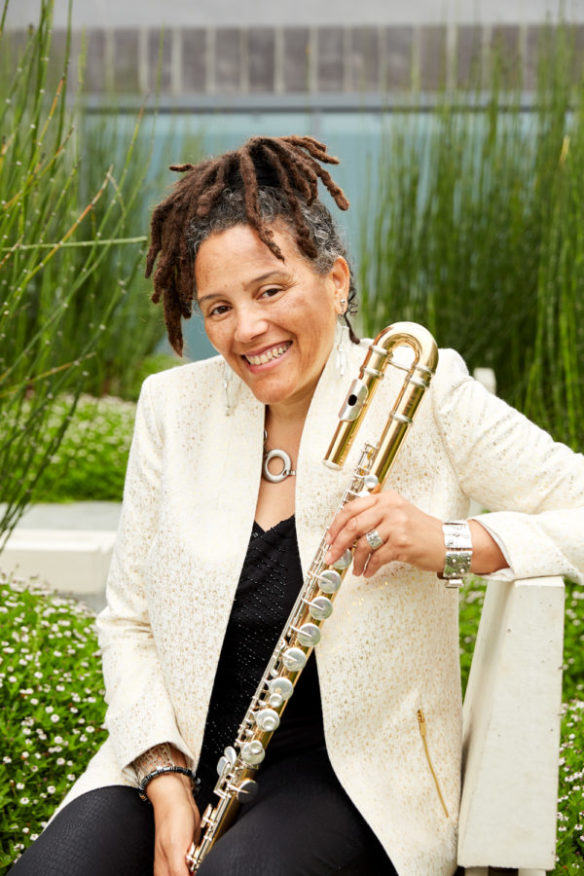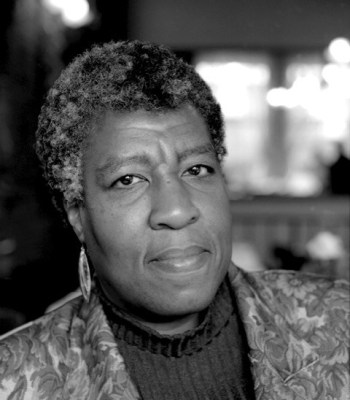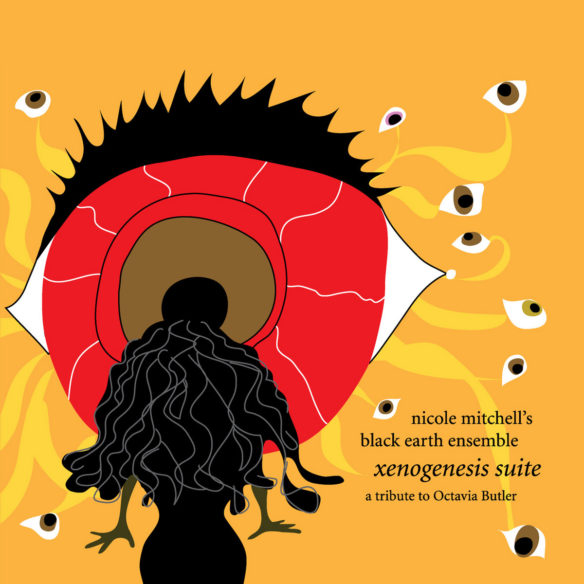
Interview conducted by Rob Thornton: Critic Mark Dery created the term “Afrofuturism” in his influential essay “Black to the Future” (1993). In the essay, he included an extensive interview with Samuel R. Delany and pointed to Black visions of the future throughout the world, including musicians such as Sun Ra and Parliament-Funkadelic who used science fiction tropes in their music. Afrofuturism in music has continued since 1993 with Black artists such as Janelle Monae, Kool Keith, Deltron 3030, Juan Atkins, Jeff Mills, and other Black artists such as Erykah Badu and Missy Elliot using futuristic elements in their performances.
Another contributor to the Afrofuturist tradition is Nicole Mitchell, a noted avant-jazz composer and flutist. She chose to take on Octavia Butler’s most challenging works, the Xenogenesis Trilogy, and create the Xenogenesis Suite, a collection of dark and disturbing compositions that reflect the trilogy’s turbulent and complicated spirit.
She has been president of Chicago’s legendary avant-jazz organization the Association of the Advancement of Creative Musicians (AACM). Influential jazz magazine Down Beat named her a Rising Star in flute from 2004 through 2009. Currently she teaches jazz at the University of Pittsburgh and leads her group the Black Earth Ensemble.
(Note: Given the care in which Nicole gave to her answers, the email answers are provided nearly verbatim with only minimal editing.)
Rob Thornton: How were you introduced to Octavia’s works and what was your initial reaction to them?
Nicole Mitchell: I grew up reading Octavia Butler’s books off my mother’s bookshelf when I was a youth. My mother, Joan Beard Mitchell (JBM) was a self-taught Afrofuturist painter and fiction writer, so at home, I was surrounded with visionary paintings. Two images that come to mind is one with Black women cradling their infants while sitting on planets, and another with a landscape featuring three setting suns on an unknown planet. JBM was brilliant creative person from Chicago, who happened to be from the same generation and have much synergy with the founders of the Association for the Advancement of Creative Musicians (AACM), whom I would become a part of later in life.
JBM was a big fan of Octavia’s work and had lots of her books, and I wouldn’t be surprised if Octavia had inspired her leanings towards writing sci-fi. On the other hand, my father, Michael E. Mitchell, had always shared his obsession with UFO’s with the family. He believed that there were people from outer space that were much more advanced than humans, and that our life on Earth was a school. My dad had moved us to southern California in the 1970s, partly so that he and my mother could connect with what they believed was a movement of people working to advance spiritual consciousness. They were of a very small group of African Americans involved in the New Age movement. So at my home, I was immersed in a world where Butler’s fiction really came alive and made sense.
RT: Why did you choose the Xenogenesis Trilogy as a source of inspiration?
NM: I had moved to Chicago, the place of my mother’s roots, back in 1990, to continue her artistic legacy. JBM (my mom) had left the planet in 1982 when I was a teenager, and I translated her mission into my own by seeking to make music that “bridges the familiar with the unknown.” As JBM had been a self-taught poet and fiction writer, I gravitated to Third World Press (TWP), founded by Haki Madhubuti, and spent many years working there. I become a cultural mentee of Haki and Safisha Madhubuti’s Institute of Positive Education (IPE) complex, while simultaneously mentoring with musicians of the AACM, including Maia, Shanta Nurullah, George Lewis and Douglas Ewart. In 2006, met Octavia Butler when my Black Earth Ensemble performed for Chicago State University’s National Black Writer’s Conference, organized by Haki Madhubuti. In the moments that I met Octavia, her powerful, yet quiet and gentle mysterious presence reminded me of my mother, and I immediately had the idea to create a musical tribute for her.
Dawn was one of the scariest books I have ever read, because it showed me the horrific side of human nature. With Dawn, Octavia opened up a fascination in me to ponder why we as humans are so compellingly creative and yet so incredibly self-destructive. I didn’t want to mimic Octavia’s narrative with my music, but with Xenogenesis Suite, I wanted to explore the process of facing fear, because Lillith was forced to survive in a constant state of horror, isolation, and disorienting circumstances on that space ship. I realize that Octavia was exemplifying real life horrors that humans have committed to each other over thousands of years, and still today. Power is too often abused. Yet, Octavia brilliantly creates fantastical settings to give readers space to see these human flaws more clearly.


Xenogenesis Suite became a life-altering artistic challenge for me, because in a journey of facing fear, I had to access parts of myself that I was afraid of, and childhood memories where fear dominated. I had to create sounds that illuminated the uncomfortable and the disturbing, which pushed me beyond the boundaries of many of my music listeners’ expectations. (Even though I am a member of the avant garde and experimental side of the “jazz” scene, there remains a lingering expectation that music is supposed to make you feel good).

RT: Chamber Music America commissioned the Suite. How did that come about?
My original intention was to create Xenogenesis Suite in collaboration with Octavia, so that she could give input to my creation of the music. It would be a way to get to know her and to honor her as a living genius. But, literally the day after I turned my proposal to Chamber Music America in the mail, I heard that Octavia had suddenly died. So immediately I decided, whether I got support or not, I was going to do Xenogenesis Suite.
NM: Chamber Music America has a competitive program called New Jazz Works that I submitted my proposal to and I’m grateful that their panel chose to support Xenogenesis Suite that year. It allowed me to be able to fund travel for my eight piece Black Earth Ensemble from Chicago to New York so that we could premiere at the Vision Festival, and it made it possible for us to cover recording costs, travel, hotel and artists fees to record the Xenogenesis Suite album in New Haven for the Firehouse 12 record label.
[Read Part II of the interview tomorrow.]
Discover more from File 770
Subscribe to get the latest posts sent to your email.

Click.
Find the album at:
https://firehouse12records.bandcamp.com/album/xenogenesis-suite
Is that a bass flute she’s pictured holding? Tenor? I know it’s not an alto flute and I don’t think it’s a soprano sax.
@ Berni,
Since Mike supplied the photo, I can’t say for sure, but other low-pitch flutes include the alto, contrabass, double contrabass, and hyperbass. (Wikipedia)
It’s a bass flute, although its range is actually tenor. I Googled to make sure.